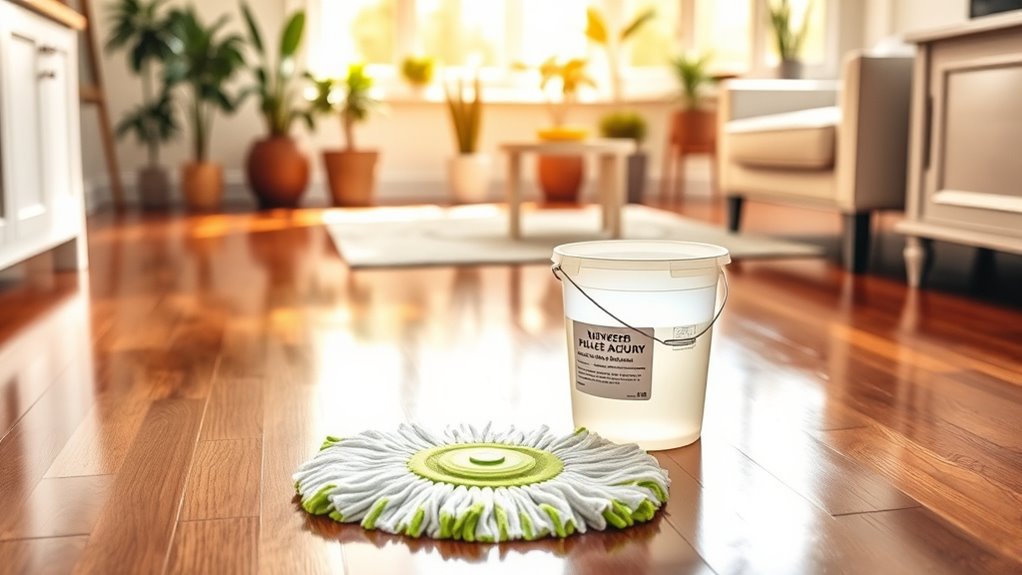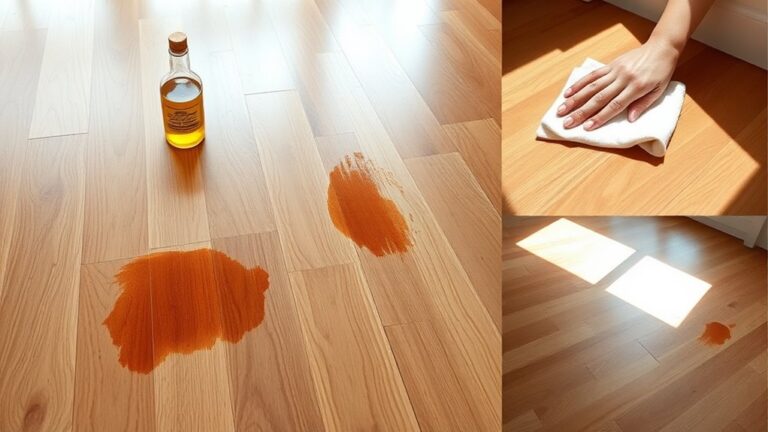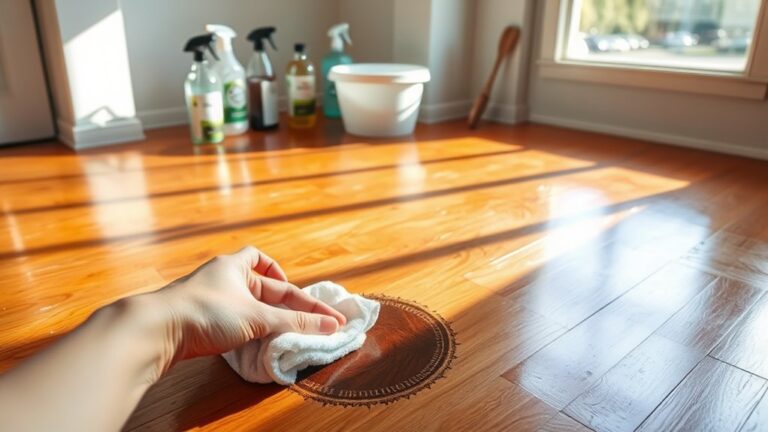You can safely clean hardwood floors by mixing white distilled vinegar with water at a 1:10 ratio to prevent damage. Sweep first, then dampen a microfiber mop with the solution—wringing out excess moisture is key to avoid water harm. Mop gently with the grain, and dry immediately using a clean cloth to protect the finish. Limit cleaning frequency to once a week and test in hidden areas. Keep following for more detailed ways to maintain your floors naturally and effectively.
Benefits of Using Vinegar for Hardwood Floor Cleaning
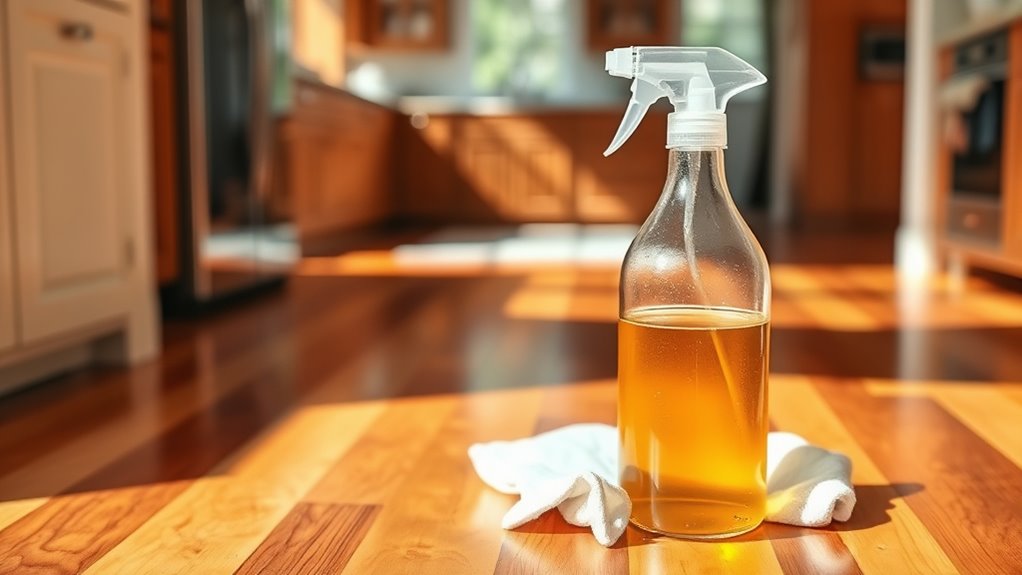
Although there are many commercial cleaners available, using vinegar to clean hardwood floors offers distinct advantages you shouldn’t overlook. Vinegar benefits include its natural disinfectant properties, making it a safe choice for maintaining hygiene without harsh chemicals. When you use vinegar, you’re selecting an effective agent that breaks down dirt and grime while preserving your floor’s finish. Its acidic nature gently lifts residue, preventing buildup without damaging wood surfaces. Moreover, vinegar’s natural composition reduces exposure to toxins, granting you freedom from synthetic additives that commercial products often contain. This means you can clean confidently, knowing you’re protecting both your home environment and the integrity of your hardwood floors. Embracing vinegar empowers you with a simple, economical, and eco-friendly solution that aligns with your desire for effective, natural cleaning.
Preparing the Vinegar Solution: Proper Dilution Ratios
Using vinegar to clean your hardwood floors is effective, but getting the dilution ratio right is key to protecting your floors while maximizing cleaning power. You’ll want to mix white distilled vinegar with water at the proper vinegar concentration to avoid damaging the wood’s finish. A safe cleaning ratio is generally one part vinegar to ten parts water. This low vinegar concentration guarantees you harness vinegar’s natural cleaning properties while preventing acidity that could strip or dull your floor’s protective layer. Stick to this ratio consistently—higher vinegar concentrations increase risk without adding cleaning benefits. By mastering these precise cleaning ratios, you maintain your floor’s integrity and enjoy a spotless surface. Proper dilution enables you to clean freely without fear of harm or residue buildup.
Step-By-Step Guide to Cleaning Hardwood Floors With Vinegar
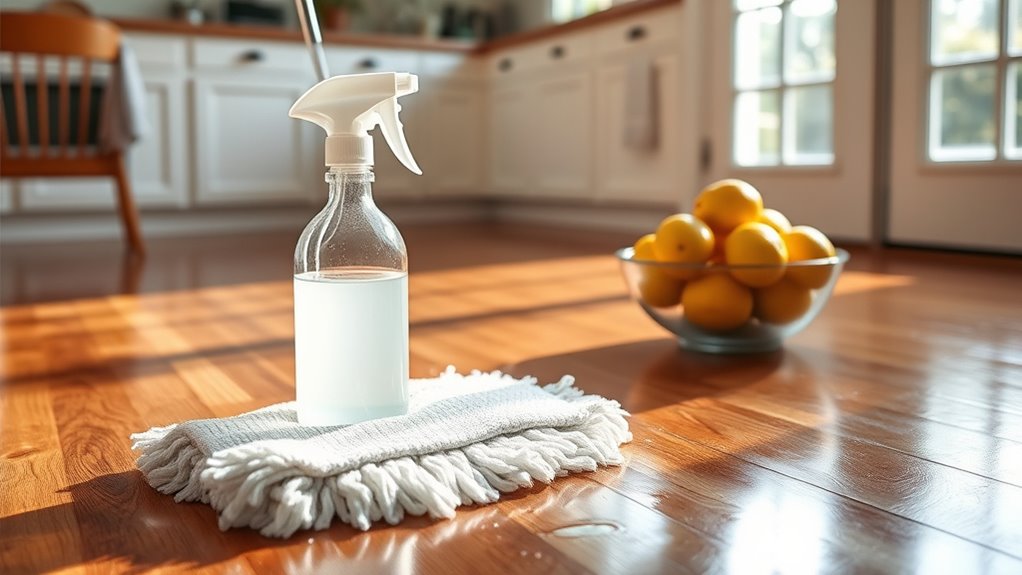
To clean your hardwood floors effectively with vinegar, follow these essential steps carefully to protect the wood while achieving a thorough clean. Begin by sweeping or vacuuming to remove dust and debris. Next, mix your properly diluted vinegar solution in a bucket, guaranteeing it matches recommended ratios for safe vloer maintenance. Dampen a microfiber mop in the solution, wring it out thoroughly to avoid excess moisture, and mop the floor in sections, moving with the grain. After mopping, rinse the mop frequently to prevent spreading dirt. Once complete, dry the floor promptly with a clean, dry cloth or towel to prevent water damage. These precise cleaning techniques guarantee your hardwood floors stay beautiful and well-maintained without risking harm from over-wetting or harsh chemicals.
Tips for Avoiding Damage While Using Vinegar on Hardwood
When working with vinegar on hardwood floors, you’ll want to guarantee it’s always diluted properly to prevent acidity from dulling the finish or damaging the wood fibers. Here are key tips to protect your floors while enjoying vinegar’s cleaning power:
- Always mix vinegar with water at a ratio of at least 1:10 to minimize acidity.
- Limit cleaning frequency to once a week or less, as overuse can erode finishes.
- Test any vinegar solution in an inconspicuous spot before full application to check for adverse reactions.
- Use vinegar alternatives like mild soap solutions occasionally to give your floors a break from acid exposure.
Alternative Natural Cleaners for Hardwood Floors
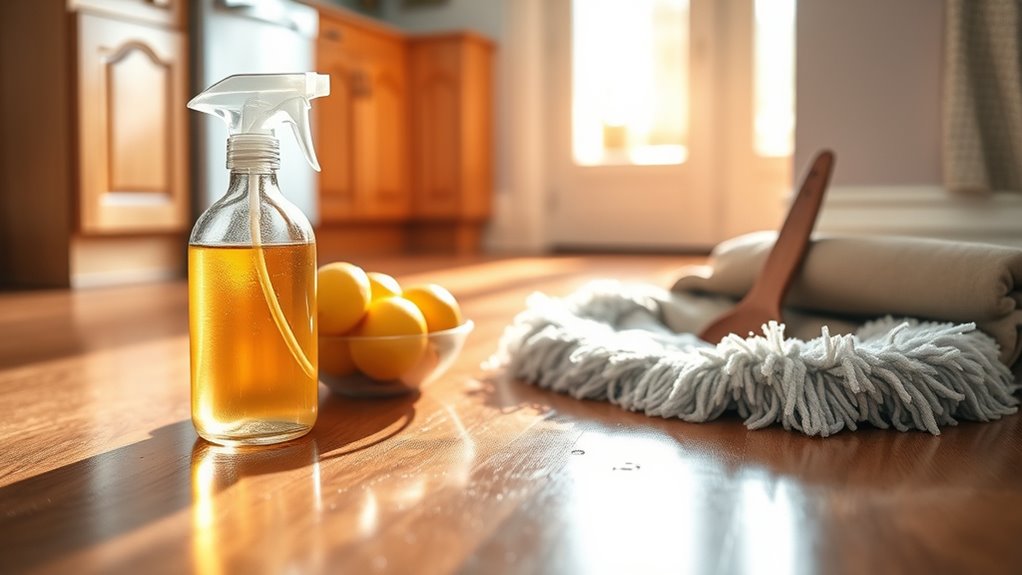
Protecting your hardwood floors from vinegar’s acidity means occasionally exploring other natural cleaning options. For a gentle yet effective alternative, consider using baking soda, which acts as a mild abrasive to remove dirt without scratching the wood surface. Simply sprinkle a small amount on a damp cloth and gently wipe the floor. To restore luster and add a protective layer, coconut oil is an excellent choice; apply it sparingly with a soft cloth, buffing until the wood gleams. Both baking soda and coconut oil provide safe, natural solutions that maintain your floor’s integrity while freeing you from harsh chemicals. By rotating these methods with diluted vinegar, you preserve your hardwood’s beauty and extend its lifespan without sacrificing cleaning power.

